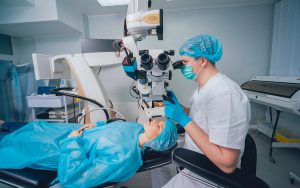Eye Twitching – Overview, Causes, Treatments
[/vc_column_text][/vc_column][/vc_row][vc_row][vc_column][vc_column_text]Eye twitching is an involuntary and repetitive spasm of the eyelid muscles. It can occur in the upper and lower eyelid, but it is more common with the upper eyelid. It is therefore not an eye twitch and is instead an eyelid twitch.The symptom is an uncontrollable eye twitch that lasts seconds at a time. It may go away in 2-3 days. Some people experience it for weeks, with the eye completely shutting with every twitch.
Types of Eyelid Twitching
There are three common types of eyelid twitching:
- Minor eyelid twitch. This type of eyelid twitch is minor and linked to everyday challenges such as fatigue or stress. It can also happen if your cornea or conjunctiva (membranes around the eyelid) become irritated. The irritation can happen if foreign substances brush against the eye.
- Benign essential blepharospasm. This often occurs in people in their mid to late adulthood years. Women are more prone to this type of eye twitching. It is semi-rare and, unfortunately, gets worse over time. While it is not dangerous, it could interfere with daily life. It starts with eye irritation then becomes non-stop blinking. Patients also develop blurry vision, light sensitivity, and complete eye shutting at times.
- Hemifacial spasm. This is the rarest form of eye twitching. It affects the muscles around your mouth and eyelid. It only affects one side of the face, unlike the other types of twitching.
Causes of Eyelid Twitching
Since they are rarely a sign of a serious medical condition, eyelid twitches can occur without identifiable causes. However, some factors could trigger or make your twitches worse. These include:
- Fatigue or lack of sleep
- Caffeine
- Tobacco
- Alcohol
- Stress
- Smoking
- Eye irritation from environmental factors such as dirt, dust, and pollen
- Dryness of the eye
- Sensitivity to light
- Eyelid strain
- Effects of pink eye
Some medications, especially those that treat epilepsy and psychosis, can also cause eye twitching as a side effect. Additionally, while it is rare, some brain and nervous system disorders can also trigger eye twitching. Usually, eye twitching comes with other symptoms when it is a medication side effect.
Some of the brain and nervous system disorders that can cause eye twitching include:
- Bell’s palsy. This is a condition also known as facial palsy. It is characterized by muscle weakness that causes one side of the face to droop. It can also cause eye twitching on one side of the face.
- Multiple sclerosis (MS). This is a potentially disabling disease of the central nervous system. It eats away at the nerves’ protective covering, leading to movement and cognitive problems.
- Brain damage. It is the deterioration or destruction of the majority of the brain cells. It results from a stroke, trauma to the head, tumors, and other illnesses.
- Dystonia. This condition is characterized by involuntary muscle contractions that cause repetitive and twisting movements. It also causes cramps, spasms, and abnormal posture.
- Tourette’s syndrome. This disorder involves repetitive movements and unwanted sounds. It affects the nervous system, and the main symptoms are verbal tics and repetitive motions.
- Parkinson’s disease. This is a brain disorder that affects movement and causes tremors. It is characterized by shaking, difficulty with balance, and stiffness. Symptoms get worse with time, and the patient also develops speech issues.
Benign essential blepharospasm twitching has also been linked to a problem in the brain’s basal ganglia. This form of twitching is therefore inherited.
Treatments
Eyelid twitching has many causes. Therefore, treatment varies depending on the cause of your eyelid twitch. If you are not a patient with any of the mentioned brain and nervous system disorders, your eye twitching could be because of everyday challenges.
If you are more stressed than usual, make time for an activity that helps reduce stress. You can take up meditation, exercise, or a calming hobby. Ensure that you get more sleep and drink less caffeine, especially after lunchtime.
Go tobaccoless for a while, and be sure to reduce your screen time to avoid exerting too much strain on your eyes. If you have dry eyes, over-the-counter eye drops can improve moisture production in the eye.
If you notice symptoms of pink eye, light sensitivity, and allergies to dust and pollen, ensure that you see an eye doctor. The doctor will conduct a thorough examination, give you a diagnosis, and prescribe treatment. This should help with eye twitching.
For people who suffer from the side effects of medication, you can also see a doctor. Do not discontinue medication just yet. Iinstead, see a doctor to advise you on the next steps to follow.
If none of these are the causes, then you may be developing a brain or nervous system disorder. The prevalent symptoms may take a while to manifest. But do not panic; it could also be an unidentifiable cause. In this situation, ensure that you visit a doctor to conduct thorough tests for an accurate diagnosis.
When To See A Doctor
Eyelid twitching is rarely a serious condition. Therefore, you will not need emergency treatment. However, chronic eye twitching could be a symptom of something more serious, such as any brain and nervous system disorders listed above.
Therefore, note how often and how long your eyelid twitching has occurred. If it happens too frequently and affects daily life, you should see a doctor. Additionally, you should go to the doctor if you notice any of the following:
- A red or discolored eye
- Swelling around the eye
- An unusual discharge from the eye
- Complete closing of the eyelid with every twitch
- Several weeks of continuous eyelid twitching
- Muscle spasms in other parts of the face
Additionally, if you have sustained an injury to the eye followed by twitching, you should also see a doctor.
Final Thought
Eye twitching is not a symptom that should cause you distress. Most of the time, it is a lifestyle factor causing the problem. Therefore, you should not panic, and instead, adopt a healthier routine to prevent twitching.
More research is currently underway to find any links to genetics, but there have been no confirmations so far. If you have any concerns or questions about eyelid twitching, visit a certified ophthalmologist.[/vc_column_text][/vc_column][/vc_row]




